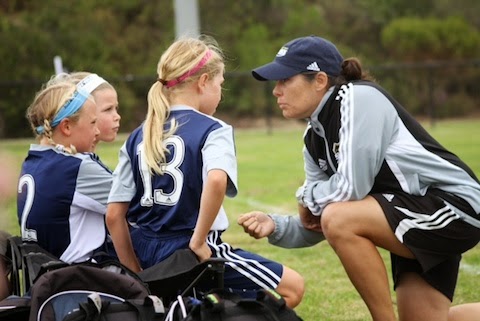Shortly after leaving coaching football at the college level 15 years ago, I took an active role in coaching my two daughters’ sports teams. I started out filling in for their regular coaches from time to time. That quickly led to full-blown service on the Little League Board of Directors.
The coaching was always the fun part. Many of you may have been considering becoming a more active part of your child’s youth sport experience. You may have already dipped your toes into the bubbling stream that is youth sports. Hopefully that experience has already been good for you. Coaching my own kids and their friends was a uniquely satisfying experience. In a strange way, it rivaled the experience of coaching in front of sixty thousand fans, or even coaching a nationally televised game. Coaching your child’s team effectively is much less daunting when a few key principles are applied.
 1. Set the tone.
1. Set the tone.
Don’t take yourself, your sport, or your record too seriously. Set an example for your parents and understand that what they want the most is for you to take an interest in their child. The parents’ perceptions of you will often be tied to their personal expectations for their child. We are still a results oriented society and the bottom line exists even in youth sports. Accept this fact and work with it. Many times parents will process the team results (won and lost record) in ways that relate to their individual child more than the team itself. You have little or no control over those expectations. That’s okay. Concentrate on making their kids better.
Build a working relationship with your parents, establishing expectations that are reasonable and attainable. I believe that parents need to understand that there have to be some boundaries once they entrust their children to you. After you have established this, go about your business as a coach with a single-minded purpose. Focus on the development of your players and the team results will take care of themselves.
2. Please be organized.
When I speak to youth sports coaches, I tell them they have to be more organized than their most organized parent. If you can’t manage that, you can hire your most organized parent. Discover the wonder of the “team mom.” These mistresses of the juice box routinely become the secret weapon of your team. When it comes to assistant coaches, grade on one consistent scale: Do they solve more problems than they cause? The first coach from my childhood was an organizational train wreck. I probably should look him up and thank him. He taught me at an early age what not to do. One of the most lasting and valuable lessons of youth sports is a simple one: Chaos is bad; organization is good.
3. Have some curb appeal.
Be yourself, only better. This is tricky. There are a lot of great youth coaches that don’t look or even act the part, but are tremendously effective, so I wouldn’t sweat this part too much. But coaches should recognize that this is a public relations job, and they should approach the job accordingly. How far does a first impression go with your players? How about with their parents? Successful coaches tend to be categorized two ways: Fun Guy and Sports Guy. Fun Guy is approachable, like everyone’s favorite uncle. This pays great dividends, especially with the younger athletes. Sports Guy uses his expertise to instill confidence in his players and their parents. If you can channel both into your coaching style, kids and parents will start requesting your services each season. One very important tip – never ask your own children how “cool” you are!
4. Communication is key.
Pull out the big words. Expectations, discipline, and philosophy should all be a part of this very public conversation. I suggest putting it all in writing. You expect kids to show up for practice on time, for example. Listening to the coach and treating teammates with respect are also important. This is a partnership, so make every effort to connect with your parents. Tell them a story that illustrates how you feel about competition, winning and losing. In the end, guarantee only one thing: the sincerity of your effort.
5. Raise your entertainment factor.
Continually ask yourself, are my players having fun? Work at making practice fun. There is a misconception that this could be counterproductive. Don’t fall into that “all business” trap. Find fun ways to see who really LIKES to compete. In the most pressurized youth sports coaching job that I have ever experienced, I once called off practice and took an all-star team bowling. It gave the kids a break, and it gave me a chance to see who really liked to compete, even when there was nothing at stake.
6. Manage your sports knowledge
I would never downplay the value of having a great working knowledge of any sport. The older the player, the more critical sport knowledge becomes. Never miss an opportunity to hone your craft,But remember this: Knowledge of a sport does not guarantee coaching success.
Ignoring the big picture of youth coaching will negate your personal knowledge almost every time. A coach falling in love with his own knowledge exists at every imaginable level of play – even in professional sports.
My greatest hope is that we will continue to have great volunteer coaches step up and meet the needs of our kids at every age. Many parents sign up for coaching before they know that they have what it takes to be successful. Spirit and attitude will carry you a long way in youth sports. Never underestimate what you bring to the field or court. You may find the one intangible quality that makes you stand out as a great coach. When I played Little League I had a coach with a river place and a built-in swimming pool. Best coach I ever had! Enjoy the game. N “Real Dad” Gary Criswell is proud of his two adult daughters who still have a love of sport and competition. A Mechanicsville resident, “Coach Criz” has enjoyed a career coaching at the high school, college, and arena football level.




